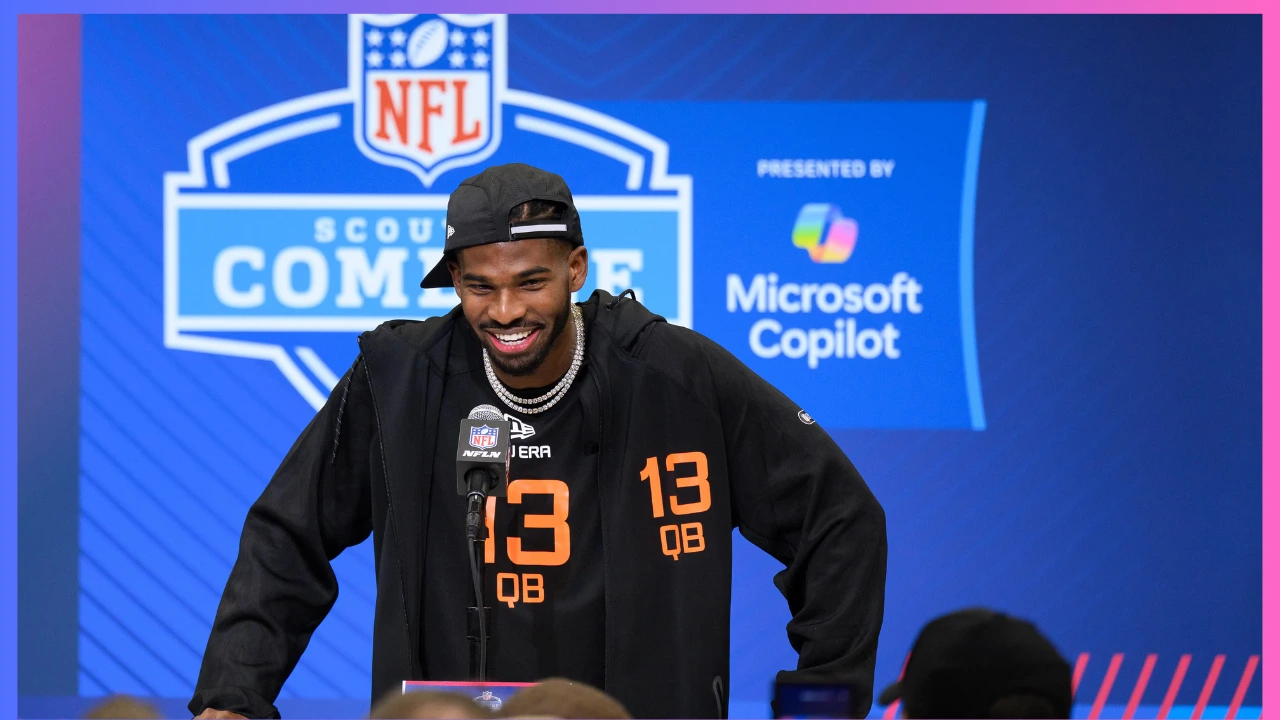The world of NFL media analysis is rarely subtle, but a recent non-verbal Shedeur Sanders Interview with the Cleveland Browns rookie quarterback has ignited a firestorm of commentary, culminating in a prominent Browns analyst labeling the player’s actions as “childish.” The incident—where Shedeur Sanders famously mimed his answers to reporters—has catapulted the third-string QB from a developmental prospect into a national headline, raising questions about media professionalism, player maturity, and the immense pressure on the son of a Hall of Famer, Deion Sanders.
The controversy centers on a post-practice media session held shortly after the Cleveland Browns named fellow rookie Dillon Gabriel as the team’s new starting quarterback, moving veteran Joe Flacco to QB2. Instead of offering the usual boilerplate responses about his role as QB3 or supporting his teammates, Shedeur Sanders chose silence, delivering a theatrical “mime act” in response to questions about the depth chart change. This unconventional Shedeur Sanders Interview quickly went viral, drawing swift and intense reactions from all corners of the sports media landscape.
The Spark: An Analyst Calls the Shedeur Sanders Interview “Childish”
The most notable and pointed criticism came from Matt Fontana, host of The Matt Fontana Show on the BIGPLAY Sports Network and a prominent Browns analyst. Fontana did not mince words when discussing the rookie’s behavior during the now-infamous Shedeur Sanders Interview.
“That is so completely unprofessional, immature and childish from a guy that was a fifth round draft pick,” Fontana stated, adding a blunt “What are you doing?” to his critique.
Fontana’s reaction encapsulated a segment of fan and media frustration who view the act as a sign of entitlement or an inability to handle the professional responsibilities of an NFL player, regardless of his position on the depth chart. The analyst’s “childish” label, directly linked to the viral Shedeur Sanders Interview, became the focus of the wider debate, putting the player’s maturity under the microscope. This criticism against the Shedeur Sanders Interview highlights the exacting standards applied to high-profile rookies, particularly quarterbacks.
Fact Check: The Context Behind the Silent Shedeur Sanders Interview
To understand the Shedeur Sanders Interview controversy, it is essential to trace the preceding events. Multiple reports indicate that the rookie’s silent protest was a direct response to a harsh public criticism he had received days earlier.
Former NFL head coach and current ESPN analyst Rex Ryan had publicly slammed Sanders after previous comments where the rookie QB expressed confidence in his readiness to play. Ryan called Sanders an “embarrassment,” suggesting he should focus on studying rather than talking about his starting potential. Many in the media, including ESPN’s Adam Schefter, reported that the silent Shedeur Sanders Interview was a deliberate, non-verbal clapback at Ryan’s public critique. This context is crucial because it reframes the Shedeur Sanders Interview not as a random act of immaturity, but as a calculated, albeit risky, move in a personal media feud. The pressure surrounding every Shedeur Sanders Interview is magnified by his lineage.
The debate, therefore, is whether an NFL player, especially one of his stature, is justified in using media access for personal retaliation, or if he is expected to adhere to a standard of professional decorum. For the Browns, a team already struggling with a 1-3 start, the ongoing media spectacle surrounding every Shedeur Sanders Interview is an unwanted distraction.
Divided Opinion: The Reaction to the Shedeur Sanders Interview
The fallout from the Shedeur Sanders Interview has created a clear split among sports commentators and fans.
The Critics: The Call for Professionalism
Critics, aligning with Fontana’s “childish” assessment, argue that no matter the perceived slight, an NFL player must handle media responsibilities with composure. The view is that silence or a mime act does not shut down the story—it amplifies it, creating a bigger headache for the organization. They suggest a simple “no comment” would have been the more professional, adult response to the questions about the depth chart change. His on-field performance is the only thing that should matter, but the Shedeur Sanders Interview makes it about something else.
The Defenders: The Defense of Media Resistance
Conversely, several prominent figures have come to the defense of Shedeur Sanders. ESPN’s Stephen A. Smith suggested that while the public may view the Shedeur Sanders Interview as immature, the judgment is “unfair,” pointing out that everything Sanders says is “micromanaged” and “dissected.” Smith defended the action as the player’s way of saying, “If you don’t hear anything that I have to say, O.K., that’s cool,” suggesting a form of justifiable media resistance.
Former MVP Cam Newton also weighed in, acknowledging the Shedeur Sanders Interview brings “circus-like attention” to the Browns, but noting the rookie’s undeniable brand value and marketability. He argued the true test of Shedeur Sanders will come on the field, not in a press conference. The media frenzy surrounding the silent Shedeur Sanders Interview is a testament to his star power.
A Star Under Scrutiny: The Unique Spotlight on Shedeur Sanders
The controversy surrounding the Shedeur Sanders Interview must be viewed through the lens of his unique celebrity. As the son of Deion “Coach Prime” Sanders, Shedeur Sanders has lived under an intense spotlight for his entire college career and is now one of the most visible rookie quarterbacks in the NFL, despite his fifth-round draft status. His jersey sales reflect this: he ranked fifth in the NFLPA’s list of best-selling jerseys in the months leading up to the season. The demand for a Shedeur Sanders Interview far outweighs his QB3 position.

This high profile means that any action, especially one as theatrical as a mime press conference, becomes national news. The pressure to live up to the “Sanders” name, coupled with the expectations on any young NFL quarterback, creates a volatile dynamic where a simple Shedeur Sanders Interview becomes a national debate over character and career trajectory.
Conclusion: The Road Ahead for Shedeur Sanders
The “childish” label placed on the Shedeur Sanders Interview reflects the harsh realities of the NFL media environment. While the rookie clearly attempted to send a message to his critics through a unique medium, the strategy backfired by shifting the focus from his potential on the field to his professionalism off it.
Ultimately, the firestorm around the silent Shedeur Sanders Interview will only truly subside when the player gets his opportunity to perform in an NFL game. Until then, every word—or in this case, every silence—from Shedeur Sanders will be scrutinized and debated. The lesson is clear: in the highly transactional, high-stakes world of the NFL, the performance on the field is the only way to silence the critics, especially after a highly criticized Shedeur Sanders Interview. The Browns and their fans are now waiting to see if this talented, yet controversial, young quarterback will let his future play speak louder than his past silence. The scrutiny will continue, and the next Shedeur Sanders Interview will undoubtedly be watched just as closely.



